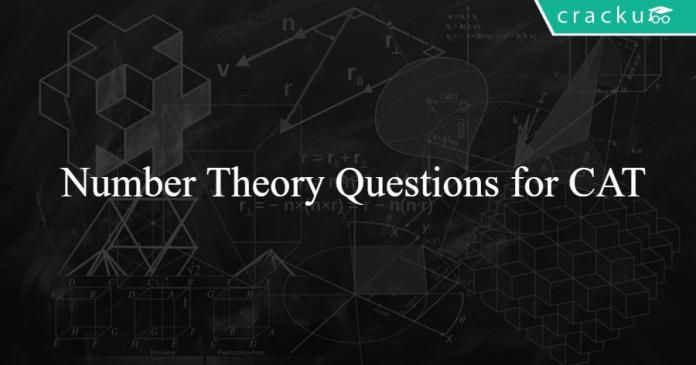Number Theory Questions for CAT:
Download important CAT Number Theory Questions PDF based on previous asked questions in CAT and other MBA exams. Top 25 Number Theory questions for CAT quantitative aptitude.
Download Number Theory Questions for CAT
Complete CAT Course for Rs. 8999
Download CAT Quant Questions PDF
Question 1: Let x=123456….424344. What is the remainder when x is divided by 45?
a) 0
b) 9
c) 4
d) none
Question 2: It is given that $k^4$ + $\frac{1}{k^4}$ = 47 (where k > 0), then find the value of $k^3 + \frac{1} {k^3}$ .
a) 18
b) 27
c) 9
d) 12
Question 3: Find the remainder when $36^{14}$ is divided by 7?
a) 1
b) 6
c) 0
d) 2
Question 4: What is the remainder when 50! is divided by 51?
a) 0
b) 1
c) 50
d) 49
Question 5: What is the difference in the number of zeroes at the end of 134! when 134! is written in base 7 and in base 10?
a) 11
b) 10
c) 12
d) 33
Download CAT Free Previous Papers
Question 6: What is the highest power of 5 that can divide 25!*125!*225!*325!*425!*525!*625! ?
a) 564
b) 562
c) 563
d) 566
Question 7: What is the highest power of 3 in 1*3*5*7*…333 ?
a) 85
b) 84
c) 83
d) 162
Question 8: If 25! is expressed in base 12, what is the number of zeroes at the end of the number?
a) 10
b) 11
c) 12
d) 9
Question 9: If n! ends in 82 zeroes, which of the following cannot be the remainder when $n^{82}$ is divided by 10?
a) 5
b) 6
c) 9
d) 7
Question 10: What is the remainder when $19^{100}$ is divided by 360?
a) 0
b) 1
c) 4
d) 18
Take a free CAT online mock test
Question 11: What is the remainder when 15! is divided by 17?
a) 1
b) 16
c) 2
d) 15
Question 12: What is the remainder when $22^{22^{22}}$ is divided by 13?
a) 8
b) 9
c) 5
d) 12
Question 13: What is the remainder when $133^{133^{133}}$ is divided by 92 ?
a) 71
b) 55
c) 41
d) 9
Question 14: What is the maximum power of 3 that divides $82^{300} -1$?
a) 4
b) 5
c) 6
d) 7
Question 15: What is the remainder when $7^{7^{7}}$ is divided by 15?
a) 12
b) 14
c) 1
d) 13
25 Mocks + 30 Sectionals for Just Rs.1249
Question 16: A number N has 27 factors. Which of the following can’t be the number of factors of $N^2$?
a) 53
b) 85
c) 125
d) 144
Question 17: N=1!*2!*3!*4!*5!*6!. How many factors of N are perfect squares?
a) 144
b) 72
c) 42
d) 36
Question 18: What is the remainder when 43! is divided by 47?
a) 8
b) 9
c) 44
d) 43
Question 19: The remainder when $4^{4^{4}}$ is divided by 36 is
a) 4
b) 8
c) 6
d) 32
Question 20: What is the remainder when $179^{208}$ is divided by 37?
a) 36
b) 19
c) 1
d) 23
Question 21: How many natural numbers X,Y and Z exist such that X*Y*Z = 144?
a) 84
b) 72
c) 60
d) 90
Question 22: Find the number of ordered pairs (a,b,c,d) such that abcd = 10800.
a) 6000
b) 7000
c) 8000
d) 9000
Question 23: Consider the following equations : x + y = 10 – |x| and x – y = 20 – |y|. Determine the value of x+y.
a) -2
b) 2
c) 0
d) 1
Question 24: Find the last two digits of $3^{400}$.
a) 99
b) 01
c) 17
d) None of the above
Question 25: What is the highest power of 45 in 70! ?
a) 16
b) 17
c) 18
d) 15
Top rated app for CAT Preparation
Answers & Solutions:
1) Answer (B)
Lets first find the sum of the digits of the given number:
Sum from 1 to 9 = 45. Sum from 10 to 19 = 45+10 =55. Sum from 20 to 29 = 65. Sum from 30 to 39 = 75. Sum from 40 to 44 = 30. Therefore total sum of the digits of the number = 270. Therefore, the number is divisible by 9.
Now, write the number as 123…4335 + 9. The first part of this number is also divisible by 9. And also by 5. Therefore the first part is divisible by 9*5=45. Therefore, the remainder when x is divided by 45 is 9. Option b).
2) Answer (A)
$k^4 + \frac{1}{k^4} +2 = 49 => (k^2+\frac{1}{k^2})^2 = 7^2 => k^2 +\frac{1}{k^2} = 7$.
Similarly, $k^2 + \frac{1}{k^2} + 2 = 9 => k+\frac{1}{k} = 3.$
$(k+1/k)^3 = k^3 + 1/k^3 + 3(k+1/k)=> k^3 +1/k^3 = 27 – 3*3 = 18.$
3) Answer (A)
Since 36 and 7 are co-primes, by Fermat’s theorem, $36^6$ mod 7 = 1 mod 7.
$36^{14}$ = $36^6 * 36^6 * 36*36$.
Therefore the remainder is 1*1*1*1 = 1.
4) Answer (A)
As 51=17*3 which are present in 50!, the remainder is 0.
5) Answer (A)
In base 10, we have to find the highest power of 10 in n! to find the number of zeroes trailing it. In base, 7, we have to find the highest power of 7 in n! to find the number of zeroes trailing it.
Highest power of 7 in 134! is [134/7]+[134/49]= 19+2 = 21.
Highest power of 10 in 134! is [134/5]+[134/25]+[134/125] = 26+5+1 = 32.
Therefore, the difference in number of zeroes is 32-21 = 11.
6) Answer (C)
The highest powers of 5 in the numbers is as shown.

The sum of all the numbers is 563.
7) Answer (B)
$1*2*3*…*333 = 333!/(2*4*6*…*332) = 333!/2^{166}*(1*2*3*…*166) = 333!/2^{166}*166!$
Therefore, highest power of 3 = highest power in 333! – highest power in 166! = 165 – 81 = 84.
8) Answer (A)
When a factorial is expressed in base 10, the number of zeroes at its end is the highest power of 10 in the factorial. When the factorial is expressed in base 12, the number of zeroes at the end is the highest power of 12 in the factorial. Since $12 = 2^2*3$, we have to find the highest powers of 3 and $2^2$ in 25! and take the minimum of the two.
Highest power of $3 = [25/3]+[25/9] = 8+2 = 10.$
Highest power of $2^2 = [{[25/2]+[25/4]+[25/8]+[25/16]}/2] = [(12+6+3+1)/2] = 11.$
Therefore the highest power of 12 in 25! = min(10,11) = 10.
So, when expressed in base 12, 25! has 10 trailing zeroes.
9) Answer (D)
Let n = 300. Therefore, n! ends in [300/5]+[300/25]+[300/125] = 74 zeroes.
Let n =350, therefore, n! ends in [350/5]+[350/25]+[350/125]= 86 zeroes. So we know that the number lies between 300 and 350. Consider 335, we can see that the number 335 ends in [335/5]+[335/25]+[335/125] = 82 zeroes.
If n =340, n! ends is [340/5]+[340/25]+[340/125]=83 zeroes.
Therefore, n can take any value from 335 to 339.
$5^{82}$ ends in 5. $6^{82}$ ends in 6. $7^{82}$ ends in 9. $8^{82}$ ends in 4 and $9^{82}$ ends in 1. Since remainder when divided by 10 is nothing but the last digit, we can see from the options that the only possibility is 7.
10) Answer (B)
We know that when $19^2$ =361 is divided by 360 the remainder is 1. Hence, $19^{100} = 19^2 * 19^2 . . . 50$ times .
Hence the remainder is Rem (1*1*1. . . 50 times)/361 = 1.
11) Answer (A)
Since 17 is a prime number, using Wilson’s theorem, (17-1)!mod 17 = -1 mod 17.
So, when 16! is divided by 17, the remainder is 16. 16! = 16*15!
16!mod 17 = (16mod17)*(15!mod17) => 16 = 16*x. Therefore, x = 1.
12) Answer (B)
13 and 22 are relatively prime, so using Fermat’s theorem, $22^{12}$ mod 13 =1.
22 mod 12 = 10, so $22^{22}$ mod 12 = $10^{22}$ mod 12
= $(-2)^{22}$ mod 12 = $2^{22}$ mod 12 = ($2^{10}$ mod 12)* ($2^{10}$ mod 12)* ($2^2$ mod 12)
= (1024 mod 12)* (1024 mod 12)* (4 mod 12) = (4*4*4) mod 12 = 4. Therefore, $22^{22}$ mod 12 = 4.
So,$ 22^{22^{22}}$ mod 13 = $22^{12k + 4}$ mod 13 = 1* ($22^4$ mod 13) = $9^4$ mod 13 = (81 mod 13)* (81 mod 13) = 3*3 = 9.
13) Answer (C)
Since 133 and 92 are co-prime, we can use Euler’s theorem to find the remainder. $92 = 2^2*23$.
$\phi(92)$ = 92(1-1/2)(1-1/23) = 44.
Therefore, $133^{44}$ mod 92 = 1.
$133^{133}$ mod 44 = $1^{133}$ mod 44 = 1.
Therefore, $133^{133^{133}}$ = $133^{44k + 1}$
$133^{133^{133}}$ mod 92 = 1* (133 mod 92) = 41.
Therefore, $133^{133^{133}}$ mod 92 = 41.
14) Answer (B)
Expanding $82^{300}$ as $(81+1)^{300}$ and subtracting 1, we get the last term as $^{300}C_{1}81$. The maximum power of 3 that divides 81 is 4 and that divides 300 is 1. So the maximum power of 3 that divides $82^{300} -1$ is 5.
15) Answer (D)
Euler’s totient function for 15 = 15(1-1/3)(1-1/5) = 8.
So, $7^8$ mod 15 = 1.
$7^7$ mod 8 = $-1^7$ mod 8 = -1 mod 8 = 7.
$7^{7^{7}}$ mod 15 = $7^{8k+7}$ mod 15 = 1 * $7^7$ mod 15 = (49*49*49*7) mod 15 = (4*4*4*7) mod15 = 16 mod 15*28 mod 15 = 13.
16) Answer (D)
For a number of N, which can be written as a product of primes $p_1^{x_1}* p_2{^x_2}*…$, the number of factors is $((x_1+1)*(x_2+1)*..)$ and the number of factors of $N^2$ is $(2x_1+1)*(2x_2+1)*..$
27 can be written as a product of numbers in three ways.
First Case: 1*27
Second Case: 3*9
Third Case: 3*3*3
In each case, the respective number of factors for N is
First Case: (2*1-1)*(2*27-1) = 53
Second Case: (2*3-1)*(2*9-1) = 85
Third Case: (2*3-1)* (2*3-1)* (2*3-1) = 125
17) Answer (C)
N = $2^5*3^4*4^3*5^2*6=2^{12}*3^5*5^2$
The number of factors of N which are perfect squares are ([12/2]+1))*([5/2]+1)*([2/2]+1)
=7*3*2=42
18) Answer (A)
Since 47 is prime, by Wilson’s theorem, 46! mod 47 = 46.
46! = 43!*44*45*46
Hence, 43!*44*45*46 mod 47 = 46
So, 43!*44*45 mod 47 = 1
So, 43!*44*45 mod 47 = 48 mod 47
Or, 43! (-3)*(-2) mod 47 = 48 mod 47
Or, 43! mod 47 = (48/6) mod 47 = 8 mod 47 = 8.
Therefore, remainder = 8.
19) Answer (A)
$4^{4^{4}}$ = $4^{256}$.
The remainder when $4^4=256$ is divided by 36 is 4.
$4^{256}$ mod $36 = 4^{64}$ mod $36 = 4^{16}$ mod $36 = 4^{4}$ mod $36 = 4$ mod $36 = 4$.
20) Answer (C)
179=37*5-6
So, the remainder equals the remainder when $6^{208}$ is divided by 37.
Which equals the remainder when $36^{104}$ is divided by 37 and is 1.
21) Answer (D)
$X*Y*Z=2^4*3^2$
Let $X = 2^x3^a$
$X = 2^y3^b$
$X = 2^z3^c$
a,b,c,x,y,z are non-negative.
Hence we have x + y + z = 4 and a + b + c = 2
Hence he number of solutions to the equation = (Number of non negative integral solutions of the equation x+y+z=4) * (Number of non negative integral solutions of the equation a+b+c=2)
Number of non negative integral solutions for x1 + x2 + … + xr = n is $^{n+r-1} C_{r-1}$
Hence he number of solutions to the equation=$^{4+3-1} C_{3-1} * ^{2+3-1} C_{3-1}$ = $^6 C_2 * ^4 C_2=90$
22) Answer (B)
$10800 = 2^4*3^3*5^2$
Hence let
$a = 2^{x_1}*3^{y_1}*5^{z_1},$
$b = 2^{x_2}*3^{y_2}*5^{z_2},$
$c = 2^{x_3}*3^{y_3}*5^{z_3}$,
$d = 2^{x_4}*3^{y_4}*5^{z_4}$
Hence we have $x_1+x_2+x_3+x_4 = 4$.
No. of solutions for this equation = $^{4+4-1}C_{4-1}$ = $^7C_3$
$y_1+y_2+y_3+y_4 = 3$ => no of soultions = $^6C_3$
$z_1+z_2+z_3+z_4 = 2$ => no. of solutions = $^5C_3$
Therefore total no of solutions = $^7C_3*^6C_3*^5C_3$ = 7000
23) Answer (B)
Case 1: x >= 0 and y >= 0:
x + y = 10 – x and x – y = 20 – y => x = 20 and y = -30, not possible.
Case 2: x >= 0 and y < 0:
X+y = 10 – x and x – y = 20 + y => x = 8 and y = -6, possible. X + y = 2
Case 3: x < 0 and y >= 0:
X + y = 10 + x and x – y = 20 – y => x = 20 and y = 10, not possible.
Case 4: x < 0 and y < 0:
X+y = 10 + x and x – y = 20 + y => y = 10 and x = 40, not possible.
Therefore, the only possibility is x+y = 2.
24) Answer (B)
Finding the last two digits of a number is equivalent to finding the remainder when the number is divided by 100.
Since 3 and 100 are co-prime, we can use Euler’s theorem to find the remainder.
Euler’s totient function of $100 = 100(1-1/2)(1-1/5) = 100*1/2*4/5 = 40.$
So, $3^{40}$ leaves a remainder of 1 when divided by 100.
$3^{400} = (3^{40})^{10}$.
Therefore, the reminder when $3^{400}$ is divided by 100 is also 1.
So, the last two digits of the number are 01.
25) Answer (A)
$45 = 3^2 * 5$. Highest power of 5 in 70! = [70/5] + [70/25] = 16
Highest power of $3^2$ in 70! = [ ([70/3] + [70/9] + [70/27]) / 2] =[ [23 + 7 + 2]/2 ]= 16
So, the highest power is 16





![CAT Averages Questions PDF [Important Questions] CAT AVERAGES Questions PDF](https://cracku.in/blog/wp-content/uploads/2022/07/CAT-AVERAGES-Questions-PDF-218x150.png)